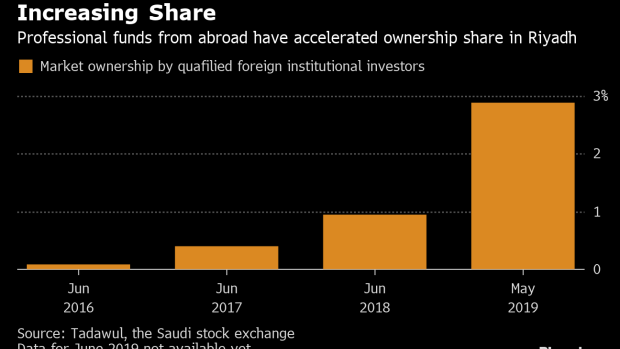Jun 15, 2019
Foreigners Bolster Saudi Stocks as Tension in the Region Mounts
, Bloomberg News

(Bloomberg) -- Rising tensions in the Gulf region aren’t stopping foreign investors from supporting Saudi Arabian stocks, just four years after funds from abroad were first allowed to trade directly in Riyadh.
International funds helped contain losses in the final trading session last week, when Gulf stocks were sold off amid escalating tensions in the region. Qualified foreign funds have been net buyers almost every week this year, helped by the addition of the kingdom to the emerging-markets benchmarks compiled by MSCI Inc. and FTSE Russell.
The Tadawul All Share Index dropped 1.6% on Thursday, trimming weekly gains to 5%, after two oil tankers were damaged near the Strait of Hormuz in a suspected attack, the second such episode in a month. The loss to the gauge would probably be steeper without passive flows, analysts said.
While the money tracking the upgrades should continue coming, “active managers might reassess the risk profile and add a geopolitical risk premium to the valuations,” said Joice Mathew, head of equity research at United Securities in Muscat, Oman.
Read: Gulf Investors See Knee-Jerk Selling in ‘Difficult Neighborhood’
Total stock ownership by international investors in Riyadh is about 6.6%, including stakes in traded companies, trailing neighbors with the emerging-market index classification. Foreigners from outside the six-nation Gulf Cooperation Council hold about 8.6% of shares in Doha, 9% in Abu Dhabi and 12% in Dubai, according to estimates by EFG-Hermes Holding.
More: Saudi Bourse Chief Sees Foreign Bets in Market Soaring by 2022
To contact the reporter on this story: Filipe Pacheco in Dubai at fpacheco4@bloomberg.net
To contact the editors responsible for this story: Celeste Perri at cperri@bloomberg.net, Jon Menon, Paul Jarvis
©2019 Bloomberg L.P.